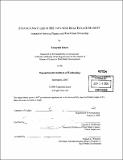| dc.contributor.advisor | Timothy J. Riddiough. | en_US |
| dc.contributor.author | Kiura, Takayuki, 1965- | en_US |
| dc.contributor.other | Massachusetts Institute of Technology. Dept. of Architecture. | en_US |
| dc.date.accessioned | 2006-03-29T18:22:43Z | |
| dc.date.available | 2006-03-29T18:22:43Z | |
| dc.date.copyright | 2000 | en_US |
| dc.date.issued | 2000 | en_US |
| dc.identifier.uri | http://hdl.handle.net/1721.1/32189 | |
| dc.description | Thesis (S.M.)--Massachusetts Institute of Technology, Dept. of Architecture, 2000. | en_US |
| dc.description | Includes bibliographical references (leaves 105-107). | en_US |
| dc.description.abstract | Finance does not matter in perfect and efficient markets. Based on neoclassical economics, financial capital is always perfectly priced, and all investments are completely valued in frictionless markets. In the real world, however, finance does matter, especially in the real estate market, which is relatively imperfect and inefficient. There are several phases through which funds flow into real estate. Among others, the interaction between the financial market and real estate investors is crucial. The financial market provides funds to investors. An efficient financial market will value real estate investments perfectly, but an inefficient financial market will not. Thus, the cost and availability of capital for investors are important factors that shape the real estate market of each country. The profile of real estate investors is also important. Inefficient investors can misdirect funds, even if the financial market is relatively perfect. The primary objective of this paper is to unveil the inefficient relationship between the financial market and real estate investors in Japan. This relationship is one of the reasons why land prices and space markets boomed and then collapsed in the late 1980's and early 1990's. Later in the paper, I will present an alternative model of the real estate market, and make several simulations under the model. | en_US |
| dc.description.statementofresponsibility | by Takayuki Kiura. | en_US |
| dc.format.extent | 107 leaves | en_US |
| dc.format.extent | 6269940 bytes | |
| dc.format.extent | 6280738 bytes | |
| dc.format.mimetype | application/pdf | |
| dc.format.mimetype | application/pdf | |
| dc.language.iso | eng | en_US |
| dc.publisher | Massachusetts Institute of Technology | en_US |
| dc.rights | M.I.T. theses are protected by copyright. They may be viewed from this source for any purpose, but reproduction or distribution in any format is prohibited without written permission. See provided URL for inquiries about permission. | en_US |
| dc.rights.uri | http://dspace.mit.edu/handle/1721.1/7582 | |
| dc.subject | Architecture. | en_US |
| dc.title | Finance matters in the Japanese real estate market : interaction between finance and real estate ownership | en_US |
| dc.type | Thesis | en_US |
| dc.description.degree | S.M. | en_US |
| dc.contributor.department | Massachusetts Institute of Technology. Department of Architecture | |
| dc.identifier.oclc | 48454982 | en_US |
